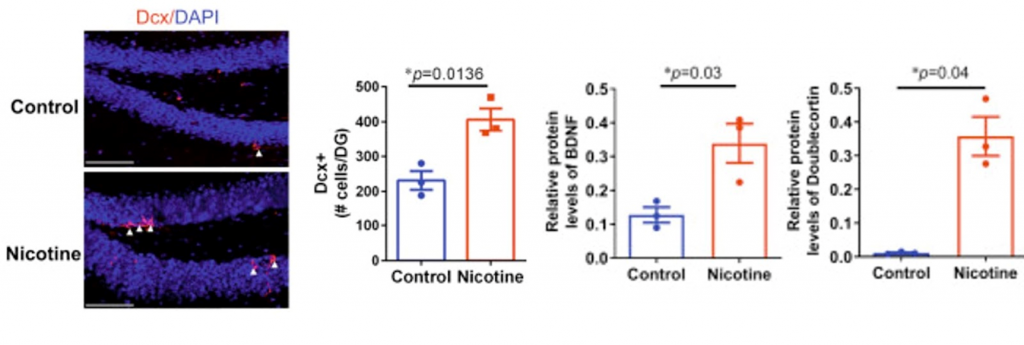Key Points:
- Nicotine, in small doses, can markedly improve NAD+ synthesis in aging mice.
- Low-dose nicotine may improve cell energy metabolism and associated physiological activity.
- Nicotine-supplemented water ameliorates anxiety and cognitive deficits in aged mice.
Researchers at the Shenzhen Institute of Advanced Technology have found that taking low doses of nicotine over a long period of time slows down the aging process. Nicotine helped fix problems with how cells used energy and slowed down the deterioration and loss of memory that come with getting older. It did this by boosting neurogenesis, stopping inflammation in the nervous system, and protecting organs. The researchers propose a mechanism by which nicotine rebalances levels of NAD+, a molecule important for cell energy that declines with age, in older mice. The research was published in Nature Communications.
Nicotine and Neuroprotection
Chronic and acute nicotine exposure have different effects on the structure, function, and behavior of the brain during pregnancy, adolescence, and adulthood. When a baby is exposed to nicotine during the perinatal period, it affects growth, heart and lung function, the endocrine system, motor function, attention, and reward. Adolescent nicotine exposure enhances susceptibility to addiction, impulsivity, and mood disorders.
Researchers are finding more and more evidence that nicotine may help treat diseases of the nervous system. Studies showed that smoking is linked to a lower rate of Parkinson’s disease, which is where this idea first came from. Smokers are less likely to get dementia, which has led to more research into the role of nicotinic effects in neurodegenerative diseases. A U.S. government-funded veteran’s study found that smoking reduced Parkinson’s deaths by 64%.
Nicotine has been shown to protect nerve cells, especially in areas key to learning, memory, and cognition. Experiments using neuronal cell lines or cultures from different brain areas—such as those involved in neurodegenerative disorders—show that nicotine pre-treatment can reduce damage from toxicity. The fact that nicotine has different effects on different toxic insults in different cultures and brain regions suggests that nicotine has the ability to protect a wide range of people.
Nicotine Rebalances NAD+ to Improve Aging Brains
Nicotine has been shown to control NAD+ levels. As people get older, the balance of NAD+ is thrown off, leading to a big drop that is linked to age-related problems. To make more NAD+, researchers have tried giving the body NAD+ precursors or turning on the enzymes that make NAD+.
In mammalian cells, most NAD+ precursors are eventually converted into NAD+ via an enzyme called NAMPT. As NAMPT activity decreases with age, it results in NAD+ depletion and cognitive impairment. Conversely, NAMPT enhancers can effectively increase NAD+ levels and slow down neuronal degeneration. Therefore, increasing NAMPT activity might be a way to halt aging and the diseases that come along with it because a decline in NAD+ is the root cause of both.
So, the Shenzhen-based research team examined the role that nicotine may play in rebalancing NAD+ levels to affect aging. After low-dose nicotine administration in drinking water (2 μg/mL) from 6 to 12 months, NAMPT activity and NAD+ levels were significantly restored in the brain, heart, and muscle tissues of middle-aged mice, as well as in aged mouse brain cells cultured in lab dishes. High-dose nicotine, on the other hand, had a negative effect on NAMPT activity and NAD+ levels.
Senescence is a cause of aging that happens when cells stop growing and dividing. It also makes inflammation last longer. This causes NAD+ to drop and leads to dysfunctional metabolism. Low-dose nicotine was also shown to regulate signaling pathways and metabolism involved in senescence cells.

Conversely, nicotine increased the amount of an important protein that drives the formation of new brain cells (neurogenesis) and cognitive function (BDNF) In the aged brain. With this, the number of newly formed neurons in the brain region critical for learning and memory (hippocampus). Importantly, this low-dose nicotine treatment also led to cognitive improvement, specifically decreased anxious behaviors and increased performance in learning and memory tasks.

Unique Effects of Nicotine Across the Lifespan
The debate over nicotine’s brain-protective versus toxic effects is complex. The effects of nicotine depend a lot on when in life it’s used. This is because the neural circuitry in a developing brain isn’t fully developed until later in life, so the bad effects of using nicotine are more noticeable in younger people. Since nicotine use in adults also positively influences learning, memory, and attention, and improves mood, stress regulation, and anxiety, the potential benefits of low-dose nicotine may outweigh the negative consequences.
This doesn’t mean you need to pick up smoking or the use of nicotine pouches or gum. There is a lot of evidence that some foods, especially plants in the family Solanaceae, like potatoes, tomatoes, and eggplant, contain nicotine. If you are worried that you might get addicted to its nicotine alkaloids, it is not likely to happen. Why? It’s mostly because the amount of nicotine is so small compared to tobacco, and because eating it is different from smoking or breathing it in.